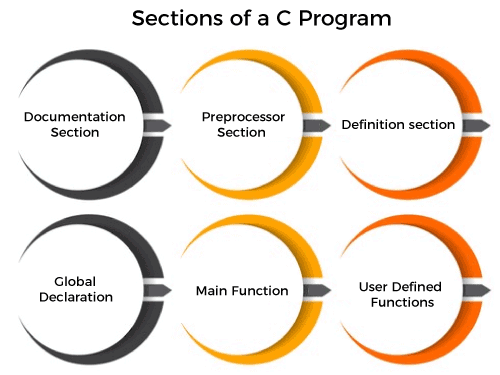C Programming Language
programming classes in vizag
You may learn everything from fundamental to intermediate C programming concepts—such as variables, arrays, pointers, strings, loops, etc.—in this C tutorial. This C programming tutorial is intended for professionals with varying levels of expertise who want to learn and advance their C programming skills.
What is C?
C is a high-level, procedural, general-purpose programming language that is used for creating games, system programming, computer software, and applications.
- It is a powerful and flexible language which was first developed for the programming of the UNIX operating System.
- C is one of the most widely used programming languages.
The C programming language is renowned for its effectiveness and simplicity. Since it provides you with a fundamental understanding of programming, it is the ideal option for you to begin with.
Getting Started With C Tutorial
Use our free C tutorial to get started on your coding journey. This lesson is your key to understanding the magic of C programming and is ideal for both novice and expert programmers. with enjoyable examples and concise explanations.
Table of Content
- C Basics
- C Variables and Constants
- C Data Types
- C Input/Output
- C Operators
- C Control Statements Decision-Making
- C Functions
- C Arrays & Strings
- C Pointers
- C User-Defined Data Types
- C Storage Classes
- C Memory Management
- C Preprocessor
- C File Handling
- C Error Handling
- C Programs
- Miscellaneous
- C Interview Questions
C Language Introduction
Dennis Ritchie created the procedural programming language C at Bell Laboratories of AT&T Labs in 1972. It was primarily created to build the UNIX operating system as a system programming language.
The main features of the C language include:
- General Purpose and Portable
- Low-level Memory Access
- Fast Speed
- Clean Syntax
These features make the C language suitable for system programming like an operating system or compiler development.
Why Should We Learn C?
Many later languages have either directly or indirectly inherited syntax and features from the C language. The C language is the primary foundation for many other languages, including PHP, JavaScript, and Java syntax. Only a small number of programs can compile in C, but not in C++. C++ is practically a superset of C.Python training in Vizag
Therefore, learning C programming first will aid in learning any other modern programming language. Understanding C facilitates comprehension of the operating system's fundamental architecture. such is using pointers, manipulating memory locations, etc.
Difference Between C and C++
The concept of OOPs was introduced into the C language with the creation of C++, so while the two languages share a similar syntax, they differ slightly. The primary distinctions between the programming languages C and C++ are listed here.
Whereas C only has a procedural understanding of programming, C++ supports the OOPs paradigm.
C++ has the ability to handle exceptions. We must manually resolve in C.
C has no references.
There are numerous other distinctions between C and C++ that are covered in this article: What separates C++ from C
Application of C
- Operating systems: C is widely used for developing operating systems such as Unix, Linux, and Windows.
- Embedded systems: C is a popular language for developing embedded systems such as microcontrollers, microprocessors, and other electronic devices.
- System software: C is used for developing system software such as device drivers, compilers, and assemblers.
- Networking: C is widely used for developing networking applications such as web servers, network protocols, and network drivers.
- Database systems: C is used for developing database systems such as Oracle, MySQL, and PostgreSQL.
- Gaming: C is often used for developing computer games due to its ability to handle low-level hardware interactions.
- Artificial Intelligence: C is used for developing artificial intelligence and machine learning applications such as neural networks and deep learning algorithms.
- Scientific applications: C is used for developing scientific applications such as simulation software and numerical analysis tools.
- Financial applications: C is used for developing financial applications such as stock market analysis and trading systems.
Features of C Programming Language
Procedural programming is done in C. Dennis Ritchie created it at the beginning in 1972. The primary purpose of its development was as a system programming language for creating operating systems.
Low-level memory access, a small list of keywords, and a clean writing style are the primary characteristics of the C language, which makes it appropriate for system programming such as operating system or compiler development.
What are the Most Important Features of C Language?
Here are some of the most important features of the C language:
- Procedural Language
- Fast and Efficient
- Modularity
- Statically Type
- General-Purpose Language
- Rich set of built-in Operators
- Libraries with Rich Functions
- Middle-Level Language
- Portability
- Easy to Extend
1. Procedural Language
Predefined instructions are carried out step by step in a procedural language like C. A C program may have multiple functions to do a given task. Those who are unfamiliar with programming may believe that this is the only way a certain language may be used. In the field of programming, there are other paradigms. An object-oriented programming language is employed in the majority of regularly used paradigms.
2. Fast and Efficient
Programming languages that are more recent, such as Python and Java, have more features than C, but because they require more processing, these languages perform less well. Programmers can directly manipulate computer hardware with the C programming language, which is a middle-level language; higher-level languages cannot do this. This is among the explanations for why learning C is thought to be the best place to start when learning any programming language. It is quick because languages with statically typed characters are quicker than those with dynamic typing.
3. Modularity
The concept of storing C programming language code in the form of libraries for further future uses is known as modularity. This programming language can do very little on its own most of its power is held by its libraries. C language has its own library to solve common problems.
4. Statically Type
C programming language is a statically typed language. Meaning the type of variable is checked at the time of compilation but not at run time. This means each time a programmer types a program they have to mention the type of variables used.
5. General-Purpose Language
From system programming to photo editing software, the C programming language is used in various applications. Some of the common applications where it’s used are as follows:
- Operating systems: Windows, Linux, iOS, Android, OXS
- Databases: PostgreSQL, Oracle, MySQL, MS SQL Server, etc.
6. Rich set of built-in Operators
It is a diversified language with a rich set of built-in operators which are used in writing complex or simplified C programs.
7. Libraries with Rich Functions
Robust libraries and functions in C help even a beginner coder to code with ease.
8. Middle-Level Language
As it is a middle-level language so it has the combined form of both capabilities of assembly language and features of the high-level language.
9. Portability
C language is lavishly portable as programs that are written in C language can run and compile on any system with either no or small changes.
10. Easy to Extend
Programs written in C language can be extended means when a program is already written in it then some more features and operations can be added to it.

















0 Comments
If you have any doubts,please let me know